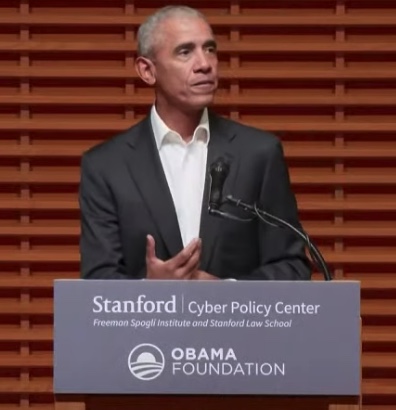
2022-4-26 23:33:21 Author: blog.avast.com(查看原文) 阅读量:21 收藏
Obama discussed the role of government in online technologies, the relationship between democracy and tech companies, and the role of digital media to elevate authoritarian rulers.
Last week, Barack Obama delivered a keynote address at an event, “Challenges to Democracy in the Digital Information Realm”, co-hosted by The Stanford Cyber Policy Center and the Obama Foundation. The in-person event had more than 250,000 people in attendance, and it was also streamed online. In his address, Obama discussed the role of government in online technologies, the relationship between democracy and tech companies, and the role of digital media to elevate authoritarian rulers across the globe. Fellow speakers at the event included Maria Ressa, the 2021 Nobel Peace Prize winner for her reporting in the Philippines, and Technical Research Manager at Stanford Internet Observatory Renee DiResta. Image credit: Stanford Cyber Policy Center At the event, Obama had a lot to say about the topic of digital communication, starting off with this confession: “I might not have been elected President if it wasn’t for the internet and MySpace, Meetup, and Facebook to spread our message.” He touched on the point that we all now occupy entirely different media realities that are fed directly into our “personal information bubbles” of our smartphones. “The days of everyone learning about the news from a common fact base are over, and today’s media environment has made democracy more complicated. This is because our digital windows to the world are now blurred, subject to unseen distortions and subtle manipulations,” he said. “All we see is a constant feed of content that flows alongside junk science and misogynist screeds, and we lose the ability to distinguish fact from fiction.” Obama stated that, as news consumers, we need to be more discriminating about our sources and think before we share links. Further reading: We have written a great deal about misinformation and disinformation, and we’ve previously provided a citizen’s guide to spotting false information. It can be used as a resource to vet your news feeds as well as understand the concept of disinformation in more detail. This is certainly a relevant topic, especially as Elon Musk takes over Twitter. That could both hurt and help freedom of speech, as Obama warned in his keynote address: “No single individual should determine who gets to hear what is posted online.” He spoke to this in a wider context, saying: “People like Putin and Steve Bannon understand that it isn’t necessary for people to believe in disinformation in order to weaken democratic institutions. You just have to plant enough conspiracy theories so that citizens lose trust in their leaders.” He faults himself back in 2016 for not realizing how many lies and false narratives were spread prior to the election. “With the emergence of AI, disinformation will grow to be more sophisticated,” he said, pointing out deepfake videos that have impersonated him. The implications for our entire social order are profound. Obama pointed out the fact that 20 years ago, web search was mainly focused on comprehensiveness, relevance, and speed. But today, companies have optimized web searches for personal engagement — and that means posting and encouraging more inflammatory and polarizing content, making democracy more vulnerable. Furthermore, he expressed how social media platforms are tilting in the wrong direction in today’s information environment in the competition between truth and falsehood. He mentioned as cases in point the 2020 US election, the Myanmar murders of minorities, and ethnic violence in Ethiopia and elsewhere. “Putin has weaponized ethno-nationalism through disinformation,” he said. Obama asked, “Do we allow our democracy to wither, or do we make it better?” He pointed out that there are some design flaws in internet and social media platforms, “some bugs in the software,” as he put it. Just like software patches, we have amended our Constitution over the years to make it more responsive and more democratic. Before providing some suggestions, Obama first stipulated a few working principles: He then went on to state the need to consider reforms to hold platforms to a higher standard of care. Obama envisions that these regulations could raise the bar for all innovative companies rather than stifle progress. He commented, “If properly structured, regulations can promote competition and democracies and innovation can co-exist.” Near the end of the keynote address, Obama urged policymakers to revise Section 230 of the Communications Decency Act, which provides immunity to online platforms from civil liability based on third-party content as well as the removal of content in certain circumstances. Regarding this act, Obama stated the need to regulate online platforms for their content and recommended greater transparency and “with the understanding that the power of their platforms comes some accountability” for tech companies to understand how content is moderated and how their algorithms operate. “Sometimes, even the people who built the algorithms aren’t sure how they operate,” he said. He mentioned the EU’s recent Digital Services Act as an example and stated that it’s time that the US government takes more of a leadership role rather than being a follower to other democracies, such as those within Europe. “We need to find the right combination of regulations and standards that will make democracies stronger,” he said. “Tools don’t control us; we can remake them to advance our values.” As one student in attendance said, “We need to take action to preserve our democracy. It is so easy to take it for granted.” Tune in to Obama’s full keynote address below.
Why we spread misinformation — and what to do about it
Tired of fake news? Here’s how to avoid it
Is your favorite mobile app being used to spread propaganda?
如有侵权请联系:admin#unsafe.sh